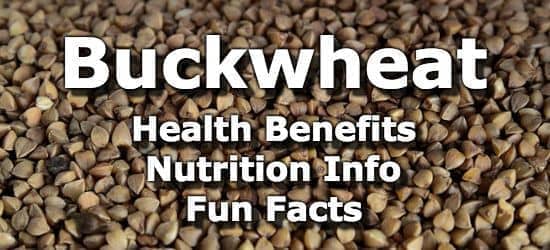Buckwheat - Health Benefits, Nutrition Info, Fun Facts
Buckwheat (Fagopyrum esculentum) is a pyramid shaped seed, that despite the name is not related to wheat at all, and is a gluten free food.
Among its many health benefits buckwheat helps regulate blood sugar, lower cholesterol, lower blood pressure, and may even help prevent the growth of cancer cells and certain types of fungus.
Buckwheat is probably most commonly eaten in Eastern Europe and Russia in its whole grain form, and also in Japan where its flour is used to make Soba noodles.
Buckwheat is highly nutritious containing large amounts of manganese, magnesium, fiber, copper, phosphorus, protein, carbs, vitamin b3 (niacin), calories, and iron. Further, it is a complete protein, containing all the essential amino acids. Read on below for more information and details on buckwheat.
Buckwheat Health Benefits
1. Buckwheat helps with the Regulation and Prevention of Diabetes
Buckwheat can be so effective in regulating blood sugar, that in Taiwan, Buckwheat is used to prevent and regulate type II diabetes. To prove the effectiveness of buckwheat, mice were fed various buckwheat extracts which were shown to regulate their blood sugar. See more in the study.(1)
2. Buckwheat Can Lower Cholesterol
In one study, rats fed buckwheat protein extract over 3 weeks had significantly lower cholesterol than rats on a control diet. (2) Rats are often used to find health benefits of a single food since humans have a more varied diet. It is worth noting that good results in rats do not guarantee good results in humans with a more varied diet, but the results are promising.
3. Buckwheat Helps Lower Blood Pressure
In another buckwheat study on rats, rats were fed germinated buckwheat or a control diet. After 6 weeks, the rats in the buckwheat group experienced significantly lower blood pressure, and as a bonus had high HDL (good cholesterol) levels. (3)
4. Buckwheat helps to Prevent and Inhibit the Spread of Cancer
In this study extracts from Buckwheat were found inhibit proliferation of hepatoma cells, leukemia cells, and breast cancer cells. (4)
5. Buckwheat is Anti-Fungal
In the same anti-cancer study the same buckwheat peptide extract inhibited growth of fungus: Fusarium oxysporum and Mycosphaerella arachidicola. (4)
Buckwheat Fun Facts
- Buckwheat is actually a seed and not a grain, though since it is nutritionally similar to cereal grains it is often called a pseudocereal.
- Buckwheat is a common food in Japan where it is often eaten in the form of Soba noodles.
- Roasted buckwheat can be brewed into a tea, and is often consumed in East Asia. Cold buckwheat tea can make a great lower calorie substitute for sodas, juices, and alcohol.
- Buckwheat is a complete protein and provides all the essential amino acids.
- Despite the name, buckwheat is not related to wheat at all, and is a gluten free food. Buckwheat is actually more closely related to rhubarb.
Data Sources and References
- Fagopyrum tataricum (Buckwheat) Improved High-Glucose-Induced Insulin Resistance in Mouse Hepatocytes and Diabetes in Fructose-Rich Diet-Induced Mice
- Consumption of Buckwheat Protein Lowers Plasma Cholesterol and Raises Fecal Neutral Sterols in Cholesterol-Fed Rats Because of Its Low Digestibility
- Effects of Germinated-Buckwheat on Blood Pressure , Plasma Glucose and Lipid levels of Spontaneously Hypertensive Rats
- A relatively stable antifungal peptide from buckwheat seeds with antiproliferative activity toward cancer cells
